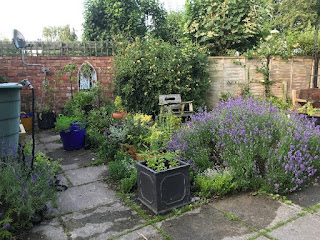Day 2
The Naming of Blogs is a difficult matter,
It isn’t just one of your holiday games;
You may think at first I’m as mad as a hatter
When I tell you, a Blog must have THREE DIFFERENT NAMES.
First of all, there’s the name that we all use daily,
Such as Foody, Debater, Protester, or Games,
Such as Poet or Musician, Bored or Twice Daily —
All of them sensible everyday names.
But I tell you, a Blog needs a name that’s particular,
A name that’s peculiar, and more dignified,
Else how can it keep up its standards spectacular,
Or spread out its wisdom in words cut and dried?
But above and beyond there’s still one name left over,
And that is the name that you never will guess;
The name that no human research can discover —
But THE BLOG ITSELF KNOWS, and will never confess.
When you notice a Blog in profound vegetation,
The reason, I tell you, is always the same:
Its mind is engaged in a rapt contemplation
Of the thought, of the thought, of the thought of its name.
In other words I couldn't think of a name!
To start off this blog - I have just read a fantastic book which I can't recommend highly enough.
Here is what I think:
The Journey: From the Killing Fields of Darfur to Royal Ascot by Abdul Musa Adam, Ros Wynne-Jones
“Why do they all want to come here?” is the constant cry of those who are frightened by the influx of immigrants from the war zones of Africa and the Middle East. Read this book and you will find out, not only why they left their own countries, but why many persevere despite desperate danger to make it to Britain.
I remember Darfur, at least I think I do. It was part of the troubles in Sudan, wasn’t it? Pictures of a barren landscape and refugee camps come into my mind. Dreadful, but quickly filed away in the file called ‘Atrocities’ that I know about but prefer not to look at too often.
I can’t do that anymore because Abdul Musa Adam has taken me there.
Driven out of Darfur, his village massacred by the Janjaweed (irregular government forces) when he was seven, Abdul, his younger brother Yusuf and two friends of his parents, Aboud and Zeinab, are the only survivors of the slaughter.
He tells us about his childhood as a nomadic herder before the troubles came, the three day trek across the desert to a refugee camp in Chad which gave relief of a sort, but was more of a giant prison camp with scant food, constant danger and no future. Aboud decides to take Abdul north to Libya where there is the chance of work, but as the journey is both illegal and very dangerous, he decides to leave Yusuf and Zeinab behind until they are settled safely in Libya. This never happens.
Life in Libya as illegals was perilous. They were in constant danger of being picked up by the police and returned to the Sudan. Work, and consequently food, was scarce.
Then Libya is also swallowed up by civil war and in the confusion Abdul is parted from Aboud. Imprisoned and tortured, he finally escapes onto a boat bound for France. Whatever welfare system there is for refugees in France, Abdul falls through it and nearly dies from starvation and hypothermia. An older refugee shows him how to stow away on a lorry bound for Britain.
The second part of the book is about his life in Britain. It is difficult and so is he, but through the perseverance of people in the social service network and the kindness of strangers, he starts to overcome the physical and mental damage caused by his eight years as a refugee. As part of his therapy he starts to work with horses and he finds his role in life.
The book is written in a clear open style that reveals the horror of Abdul’s experiences without savouring the violence. The matter-of-factness of the prose exposes the dreadfulness of his situation far more tellingly than a more emotional style would have done. All praise to Ros Wynne Jones for the sensitivity of her collaboration with Abdul.
From this book I have learnt two things.
1. When reading about hordes of refugees crowded into precarious boats or stowed away in refrigerated lorries, I shall now see Abdul and not a crowd of faceless statistics. These are people in uncontrollable situations of an awfulness that none of us has experienced or can fully imagine.
2. Britain has always had a reputation for tolerance, humanity and kindness. This rescued Abdul and saved him. We must treasure the values that earned us this reputation.
Abdul arrived in Britain in 2012, before the controversy of Brexit and the consequent rise in antagonism towards immigrants. Would he still receive the same care and attention today? I hope so. Our social services are still staffed by good and conscientious people but their numbers and funding have been cut to the bone.
Read this book and talk about it. Recommend it to friends so that people become more aware of the plight of refugees and the benefits of a good welfare system.




Comments
Post a Comment